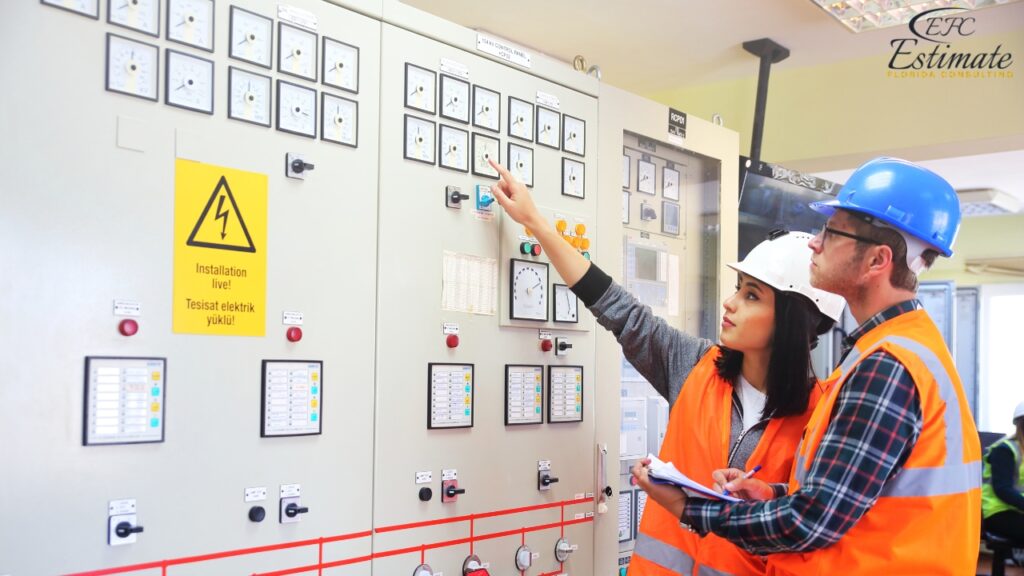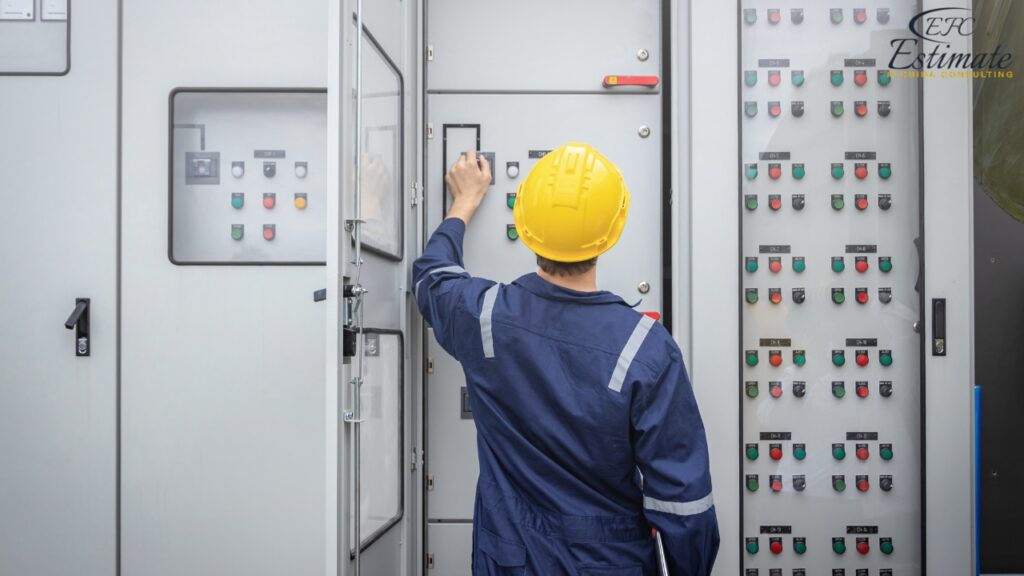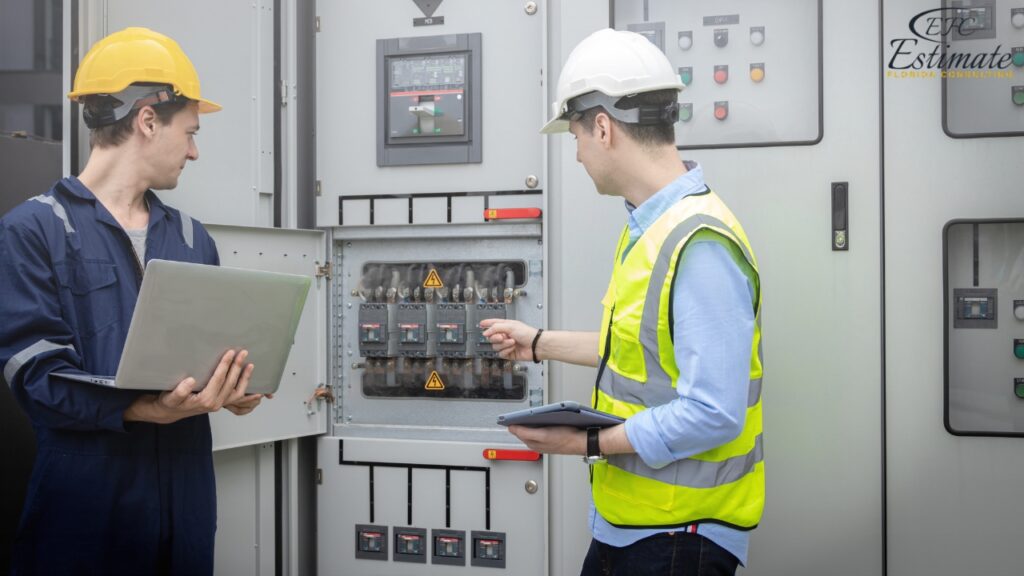Electrical Cost Per Square Foot Commercial
Estimating the electrical cost per square foot for commercial buildings is a critical aspect of budgeting for any construction or renovation project. The cost of electrical work can vary based on several factors, including the type of building, the complexity of the electrical system, and the specific requirements of the project. At Estimate Florida Consulting Services, we specialize in providing accurate and detailed cost estimates to help property managers, developers, and contractors plan their budgets effectively. This guide explores the factors influencing electrical costs for commercial buildings and offers insights to help you make informed decisions.

Key Factors Influencing Electrical Costs Per Square Foot
Several factors contribute to the variation in electrical costs per square foot for commercial buildings. Understanding these factors is key to creating a realistic budget:
Type of Commercial Building
The type of commercial building significantly impacts the electrical cost per square foot. For instance, an office building typically has different electrical requirements compared to a retail store, restaurant, or industrial facility. Each type of building has its own set of electrical needs, including the number of circuits, the type of lighting, and the complexity of the wiring system. Understanding these needs allows for a more precise cost estimation and ensures that the electrical system meets the specific demands of the building. For example, a healthcare facility might require more complex wiring and backup systems to support life-saving equipment, while a retail store might focus more on efficient lighting and security systems. The diversity in building types means that each project needs a tailored approach to ensure that all electrical demands are met efficiently and cost-effectively.
Building Type | Estimated Electrical Cost per Sq Ft |
Office Building | $5.85 – $10.40 |
Retail Store | $6.50 – $11.70 |
Restaurant | $9.10 – $15.60 |
Industrial Facility | $10.40 – $19.50 |
Healthcare Facility | $13.00 – $23.40 |
Complexity of the Electrical System
The complexity of the electrical system also plays a significant role in determining costs. Buildings with advanced electrical systems, such as those with integrated smart technology, high-tech security systems, or specialized equipment, will have higher costs per square foot. Additionally, buildings with extensive wiring requirements, multiple floors, or custom lighting designs may incur additional expenses due to the increased labor and materials needed. By accurately assessing the complexity of the system, you can better plan for these additional costs and ensure the project is adequately funded. For example, an industrial facility with complex machinery and automation systems will require a more robust and intricate electrical setup than a standard office building. This complexity not only affects the initial installation cost but also influences future maintenance and operational expenses, making it crucial to plan accordingly.
Complexity Level | Estimated Cost per Sq Ft |
Basic (Standard Wiring) | $5.85 – $7.80 |
Moderate (Additional Circuits, Lighting) | $7.80 – $13.00 |
Complex (Smart Systems, Specialized Equipment) | $13.00 – $23.40 |
Location and Labor Costs
The location of the commercial building can affect electrical costs due to variations in labor rates and the availability of skilled electricians. In areas with a higher cost of living or a shortage of qualified labor, the cost per square foot may be higher. Additionally, local building codes and regulations can impact costs by requiring specific types of wiring, conduit, or electrical components that may be more expensive. Understanding the local market conditions and labor availability can help you anticipate these costs and plan accordingly.

For instance, urban areas might offer easier access to skilled labor but at a higher cost, while rural locations might save on labor expenses but face challenges in sourcing materials or specialized skills. These regional differences are crucial in shaping the overall budget and ensuring that the project remains feasible and cost-effective.
Region | Estimated Labor Cost per Sq Ft |
Urban (High Cost of Living) | $6.50 – $11.70 |
Suburban | $5.85 – $10.40 |
Rural | $5.20 – $9.10 |
Electrical Code Compliance and Permitting:
Ensuring compliance with local electrical codes and obtaining the necessary permits is another factor that can influence costs. Electrical work must meet stringent safety standards, and the cost of ensuring compliance can vary based on the complexity of the project and the local regulatory environment. Permitting fees, inspections, and potential modifications to meet code requirements should be factored into the overall budget. By staying informed about local regulations and working closely with experienced professionals, you can ensure compliance while managing costs effectively. Failing to adhere to these standards can lead to costly rework or delays, so it’s crucial to account for these factors early in the planning process. Understanding the specific requirements of your area, such as energy efficiency standards or special safety protocols, can also influence the choice of materials and systems, thereby affecting the total cost.
Compliance and Permitting | Estimated Cost per Sq Ft |
Standard Compliance | $0.65 – $1.30 |
Complex Compliance (High Standards) | $1.30 – $2.60 |
Get Acquainted with Electrical
Understanding Electrical Components and Their Costs
Commercial electrical systems are composed of various components, each contributing to the overall cost. Here’s an overview of some key components and their associated costs:
Wiring and Conduit
Component | Estimated Cost per Sq Ft |
Copper Wiring | $1.95 – $3.25 |
Aluminum Wiring | $1.30 – $2.60 |
Conduit Installation | $0.98 – $1.95 |
The cost of wiring and conduit is a significant component of the overall electrical budget. The type of wiring used (e.g., copper vs. aluminum) and the amount of conduit required can vary depending on the building’s size and layout. Wiring costs also include the installation of outlets, switches, and circuit breakers. Investing in high-quality wiring and conduit is essential for ensuring the safety and reliability of the electrical system, which can prevent costly repairs and maintenance in the future. High-quality materials not only enhance the durability of the electrical system but also contribute to better energy efficiency, reducing operational costs over the life of the building.
Lighting Systems
Lighting is an essential part of any commercial electrical system, and the cost can vary based on the type of lighting fixtures chosen. LED lighting, for example, is more energy-efficient but can have higher upfront costs compared to fluorescent or incandescent lighting. Additionally, specialty lighting, such as emergency lighting or architectural lighting, can increase costs. Choosing the right lighting system not only enhances the functionality and aesthetics of the building but also contributes to energy savings, which can offset the initial investment over time. Moreover, well-designed lighting can improve the overall work environment, increasing productivity and satisfaction among occupants.
Lighting Type | Estimated Cost per Sq Ft |
Standard LED Lighting | $3.25 – $5.20 |
Fluorescent Lighting | $1.95 – $3.90 |
Specialty Lighting | $5.20 – $9.10 |
Electrical Panels and Circuit Breakers
The installation of electrical panels and circuit breakers is necessary for managing the power distribution within the building. The number and size of panels required depend on the building’s electrical load and the complexity of the system. Properly installed electrical panels and circuit breakers are crucial for the safe and efficient operation of the electrical system, reducing the risk of power outages and electrical fires. Additionally, having an appropriately designed panel system allows for future expansions or upgrades, making the building more adaptable to technological advancements or changing needs.
Component | Estimated Cost per Sq Ft |
Main Electrical Panel | $2.60 – $5.20 |
Sub-Panels | $1.95 – $3.90 |
Circuit Breakers | $0.65 – $1.30 |
Emergency and Backup Systems
Emergency and backup systems, such as generators and uninterruptible power supplies (UPS), are critical for ensuring continuous power in case of outages. These systems are especially important in healthcare facilities, data centers, and other commercial buildings where power reliability is essential. Investing in reliable backup systems can prevent costly disruptions and ensure the safety and security of the building’s occupants.

Furthermore, these systems provide peace of mind to business owners and tenants, knowing that operations can continue smoothly even in the event of power failures, which can be crucial for businesses that rely heavily on consistent power supply.
Backup System Type | Estimated Cost per Sq Ft |
Generators | $6.50 – $13.00 |
Uninterruptible Power Supply (UPS) | $3.25 – $6.50 |
How Much Does It Cost to Hire an Electrician?
Hiring a qualified electrician is essential for any commercial electrical project. The cost of hiring an electrician can vary depending on their level of expertise, the scope of the project, and the location. Electricians typically charge either an hourly rate or a flat fee for specific tasks. For complex projects, such as wiring a large commercial building, you may also need to hire a team of electricians, which can increase the overall cost.
Type of Electrician | Estimated Hourly Rate |
Apprentice Electrician | $65 – $97 |
Journeyman Electrician | $97 – $130 |
Master Electrician | $130 – $195 |
How Much Does It Cost to Wire a Building?
Wiring a building involves installing all necessary electrical systems, including wiring, outlets, switches, lighting, and circuit breakers. The cost to wire a building depends on the size of the building, the complexity of the electrical system, and the specific requirements of the project. For example, wiring a small office building may cost less per square foot than wiring a large industrial facility due to differences in the number of circuits and the type of electrical components required.
Building Size | Estimated Wiring Cost |
Small Office Building (10,000 sq ft) | $65,000 – $104,000 |
Medium Office Building (50,000 sq ft) | $325,000 – $520,000 |
Large Office Building (100,000 sq ft) | $650,000 – $1,040,000 |
How Much Does It Cost to Wire a Commercial Building?
Wiring a commercial building is a more complex task due to the diverse electrical needs of different commercial spaces. The cost to wire a commercial building depends on factors such as the type of business, the number of floors, the presence of specialized equipment, and the need for advanced systems like data cabling and security systems. Retail stores, restaurants, and healthcare facilities, for example, have unique electrical requirements that can significantly impact the overall cost.
Commercial Building Type | Estimated Wiring Cost per Sq Ft |
Retail Store | $6.50 – $11.70 |
Restaurant | $9.10 – $15.60 |
Healthcare Facility | $13.00 – $23.40 |
How Much Does It Cost to Wire a Metal Building?
Wiring a metal building presents unique challenges due to the material and construction methods used. Metal buildings often require specialized wiring techniques to ensure safety and code compliance. The cost to wire a metal building can vary depending on the size of the building, the intended use, and the complexity of the electrical system. For example, wiring a metal warehouse will differ from wiring a metal office or retail space.
Metal Building Size | Estimated Wiring Cost per Sq Ft |
Small Metal Building | $7.80 – $13.00 |
Medium Metal Building | $10.40 – $19.50 |
Large Metal Building | $13.00 – $23.40 |
Download Template For Electrical Project Breakdown
- Materials list updated to the zip code
- Fast delivery
- Data base of general contractors and sub-contractors
- Local estimators

Strategies for Reducing Electrical Costs in Commercial Projects
Managing electrical costs effectively is crucial for staying within budget while ensuring a high-quality installation. Here are some strategies to help you reduce costs without compromising on quality:
- Optimize Electrical Design: Work with experienced electrical engineers to optimize the design of the electrical system. By streamlining the layout, reducing unnecessary circuits, and selecting cost-effective materials, you can minimize costs without compromising performance. Optimizing the design also ensures that the electrical system is scalable, allowing for future upgrades or expansions without significant additional costs.
- Prioritize Energy Efficiency: Investing in energy-efficient lighting and electrical systems can reduce long-term operating costs. While the initial investment may be higher, energy-efficient systems can lead to significant savings on utility bills over time. Additionally, energy-efficient buildings are more attractive to tenants and can command higher rents, further improving the return on investment.
- Consider Phased Installation: For large projects, consider phasing the installation of electrical systems. This approach allows for better budget management and can help avoid cash flow issues during construction. Phased installation also provides flexibility, enabling you to prioritize critical areas of the building while deferring less essential installations until additional funds become available.
- Leverage Local Incentives and Rebates: Many regions offer incentives or rebates for installing energy-efficient electrical systems. Researching and taking advantage of these programs can reduce upfront costs and improve the return on investment. Additionally, partnering with local utilities and government agencies can provide access to additional resources and support for implementing energy-saving measures.
Conclusion
Understanding the electrical cost per square foot for commercial projects is essential for effective budgeting and project planning. Factors such as building type, system complexity, location, and compliance requirements significantly influence overall costs. By working with experienced professionals and considering strategies like optimizing electrical design, prioritizing energy efficiency, and leveraging local incentives, you can manage these costs more effectively. Estimate Florida Consulting Services provides the expertise needed to ensure accurate cost estimates, helping developers and property managers make informed decisions that align with their financial goals while delivering high-quality results.
FAQs
The electrical cost per square foot for commercial buildings varies based on the building type, system complexity, and location. On average, costs range from $5.85 to $23.40 per square foot, depending on specific project needs.
The type of commercial building significantly impacts electrical costs. For example, office buildings typically have lower costs ($5.85 – $10.40 per sq ft) compared to healthcare facilities, which can range from $13.00 to $23.40 per square foot due to more complex electrical systems.
The complexity is influenced by factors such as integrated smart technology, high-tech security systems, specialized equipment, extensive wiring needs, and custom lighting designs. Complex systems can increase costs to $13.00 – $23.40 per square foot.
Location affects costs primarily due to variations in labor rates and material availability. Urban areas with higher costs of living may have labor rates from $6.50 to $11.70 per square foot, while rural areas might be lower, ranging from $5.20 to $9.10 per square foot.
Ensuring compliance with local electrical codes and obtaining permits can add to the costs, ranging from $0.65 to $2.60 per square foot. The complexity of the project and stringent local regulations can increase these costs.
Wiring and conduit installation costs vary based on material and project scope. Copper wiring typically costs $1.95 – $3.25 per square foot, while aluminum wiring is slightly cheaper at $1.30 – $2.60 per square foot. Conduit installation adds $0.98 – $1.95 per square foot.
Lighting installation costs vary depending on the type of lighting. Standard LED lighting ranges from $3.25 to $5.20 per square foot, while specialty lighting can cost up to $9.10 per square foot.
The installation cost for main electrical panels ranges from $2.60 to $5.20 per square foot, with sub-panels costing $1.95 to $3.90 per square foot. Circuit breakers typically add $0.65 to $1.30 per square foot.
Emergency systems like generators cost $6.50 – $13.00 per square foot, while uninterruptible power supplies (UPS) range from $3.25 to $6.50 per square foot. These systems are crucial for continuous power supply in critical environments.
Electrician rates vary by expertise and project complexity. Apprentice electricians charge $65 – $97 per hour, while master electricians can charge $130 – $195 per hour.
Wiring costs depend on building size and complexity. For example, wiring a small office building (10,000 sq ft) can cost $65,000 – $104,000, while larger buildings (100,000 sq ft) may range from $650,000 to $1,040,000.
Wiring a metal building presents unique challenges and costs. Small metal buildings may cost $7.80 – $13.00 per square foot, while larger structures could range from $13.00 to $23.40 per square foot, depending on complexity and usage.
Strategies to reduce costs include optimizing electrical design, prioritizing energy efficiency, considering phased installation, and leveraging local incentives and rebates for energy-efficient systems. These approaches help manage budgets while maintaining high-quality installations.
Google Reviews



Process To Get a Commercial Electrical Estimate Report
Here I am going to share some steps to get a commercial electrical estimate report.
-
You need to send your plan to us.
You can send us your plan on info@estimatorflorida.com
-
You receive a quote for your project.
Before starting your project, we send you a quote for your service. That quote will have detailed information about your project. Here you will get information about the size, difficulty, complexity and bid date when determining pricing.
-
Get Estimate Report
Our team will takeoff and estimate your project. When we deliver you’ll receive a PDF and an Excel file of your estimate. We can also offer construction lead generation services for the jobs you’d like to pursue further.

